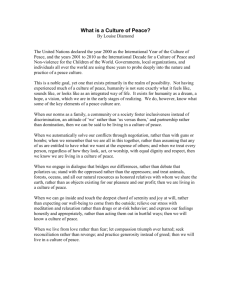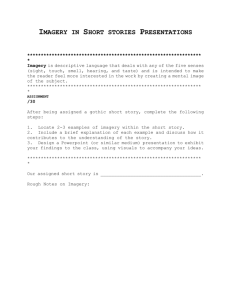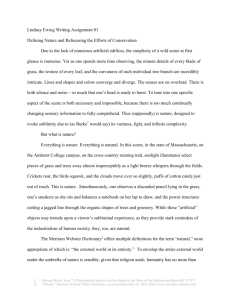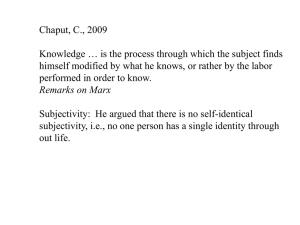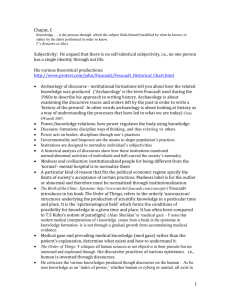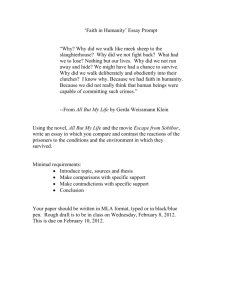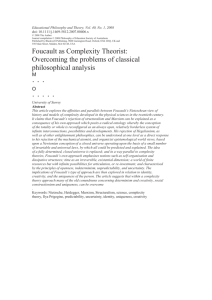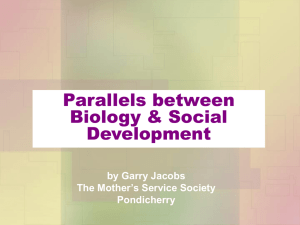An autocracy is a form of government in which the political power is
advertisement
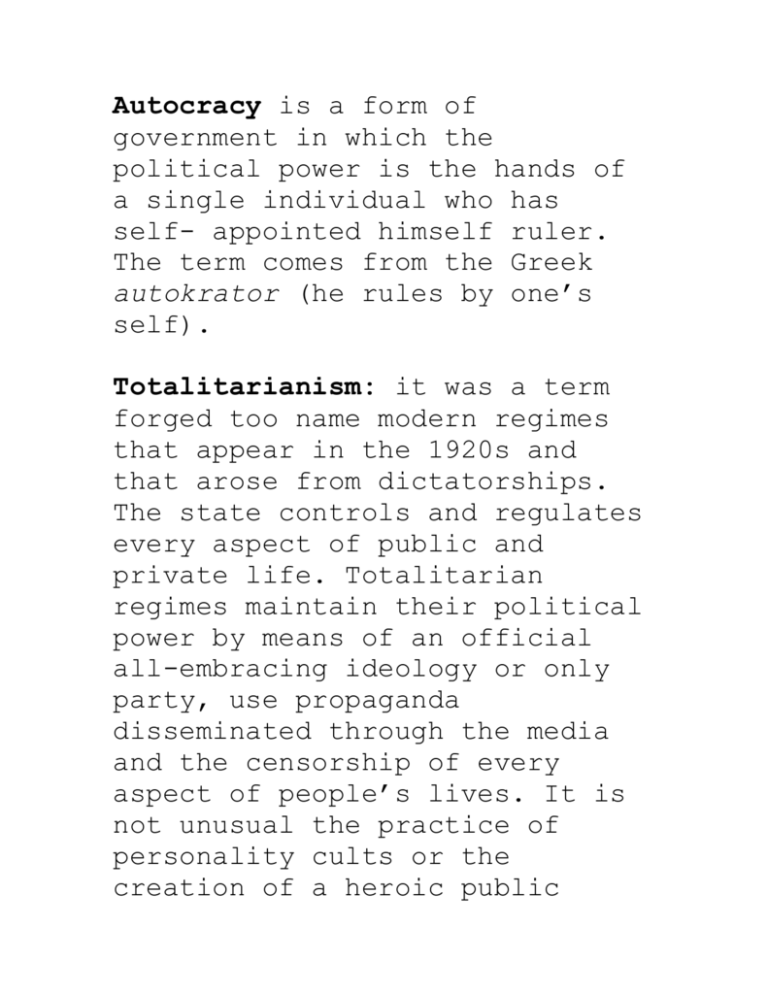
Autocracy is a form of government in which the political power is the hands of a single individual who has self- appointed himself ruler. The term comes from the Greek autokrator (he rules by one’s self). Totalitarianism: it was a term forged too name modern regimes that appear in the 1920s and that arose from dictatorships. The state controls and regulates every aspect of public and private life. Totalitarian regimes maintain their political power by means of an official all-embracing ideology or only party, use propaganda disseminated through the media and the censorship of every aspect of people’s lives. It is not unusual the practice of personality cults or the creation of a heroic public image of the ruler that is unquestioned and unchallenged. This practice comes from the ancient monarchies where the figure of the king was seen as a divine figure, whose power descended directly from God. The state controls the economy, education systems, applies mass surveillance and practices widespread terror among the citizens. A dictatorship: is a form of government in which the government is ruled by a dictator (either a military or a civilian). Roman dictators, for example, declared themselves with absolute power during times of emergency or danger. Often times, military dictatorships are the result of a coup d’état or proclamation of power. The typical Latin America’s dictatorship is ruled by a junta militar (or a board composed of several officers from the military’s senior leadership. The chairman of the junta is the dictator or head of state, with absolute power. Definition of Gender: A socially and culturally constructed concept based on the knowledge that men have created throughout the different disciplines of knowledge (especially philosophy, psychology, and the social sciences in general, and throughout the history of human kind). The concept of gender is based on definitions of men and women that have emerged from these disciplines and that, for the most part, reflected men’s perception of reality and their experience. The realities and perceptions of women (and any other individual who does not fall in the categories of feminine or masculine gender) have been excluded and silenced from that construction of knowledge/gender. From Aristotle to the modern political thinkers and philosophers (think about Sigmund Freud) these definitions of female and male that constitute the concept of gender are to a great extend faulty and essentializing. That is, reductive since they minimized humanity, especially female’s humanity, to a biological configuration). These traditions of thinking have been, however, challenged by postmodern, postcolonial, and poststructuralist’s thinkers who question the truth and validity of many of traditional thinking in all the disciplines of knowledge including the ones mentioned above. Women’s Liberation movement (and any movement who challenges traditional patriarchal discourses of knowledge and thus of power) and feminism have challenge, question, act, and change the reality of women within this traditional knowledge, and its effects in the ways that traditional knowledge has been acted in real life. Participating in Imagery Construction: How female artist can portray positive and empowering imagery of women? Marcy Percy’s novel and Julia Alvarez’s novel, Frida Kahlo, Maureen Gorris: How does their creativity (re)define symbolic meanings associated with gender? One of the challenges of creative arts is the construction on imagery in which we can see reality expresses through art. Women artists have an important role in orienting women to their own identities by creating imagery that deconstructs the idea that women should be subordinate members of a relationship (wife of so and so, mother or so and so, secretary of so and so, nurse of dr. so and so) or reduced to a part of their body (uterus, breasts, legs, hips). Women should be represented as whole beings. (Rosario Ferré and her idea of a whole female identity; one identity that is not divided by the guilt associated with leaving the private space and daring to conquer the public). Does nature have anything to do at all with being a woman? In other words, do women have nature? Does it come natural to a woman to care, to like children, to nourish? Are there social roles prescribed by nature? A simple answer: Nature DOES NOT prescribe anything. Or, can men be tender, caring, nourishing? The idea of natural dispositions or tendencies is as old as the constructions of gender and much intertwined with it. Traditional theories (philosophical and psychological in particular) have traditionally prescribe notions and definitions of women based on men’s perceptions of reality. Women, as we have studied, have had very little saying in the constructions of knowledge in the various disciplines especially philosophy and the social sciences. We, as humans, use theory to understand the world and our evolution, as mentioned in the previous lectures, knowledge (as well as categories or symbols) help us to create meaning and order. Within that theoretical construction (Western notions) definitions of the nature of women have been faulted even in the same language they use to define women, since they imply hidden sexism. These definitions of women have been based on an ignorant way in which some part of humanity (men) sees other part of humanity (women). Simmone de Beauvoir was a French philosopher who wrote way before there was a women’s liberation movement. In her book The Second Sex she explains the implications of defining woman as the “other.” That is, men are agents in the world and have created the discourses of power and knowledge excluding the experience of women because as agents they create conscious, they make history and they rule. They are agents thus also SUBJECTS and everything else is subject to be dominated and subordinated upon men. Everything else includes not only nature but women. This construction facilitates the binary opposition of subject/object or subject and “the other.” Men look up on women as other than themselves. Men act and think/Women exist. Men are active/ Women passive, Men reason/ Women feel, Men are conscious, Women are emotional. However, du Beauvoir suggests that women are still sufficiently conscious to recognize man’s humanity and achievement. Women are then conscious “other” thus able to affirm him in his manhood in a way nature cannot (The compulsory tendency to be woman). In this way man is able to reassure himself and his humanity. What are the implications of this reaffirmation given to men by women? Now, to understand himself as a human being man needs “the subject” needs other human beings rather the women and nature. Each man wants to be a sovereign subject over other men as well, this create an interminable conflict. Women’s response is neither a hostile silence (like nature’s silence) nor opposition. This encourages his desire to be master. Thus women are defined only in their relation to men (Concrete example: Spain during Franco). This view of women as the “other” has created in Western societies endless faulty theories and false assertions, and has left very little room for men and women to questions these assumptions. Michael Foucault: Power relations: The Panopticon: a prison built by Jeremy Bentham (England). Foucault’s panopticism is the idea that disciplinary power is exercised through its invisibility and at the same time it imposes on those whom it subjects a principle of compulsory visibility. Visibility is trap and creates a state of consciousness and constant visibility that assures the functioning of power. Mechanism of power: Techniques used by the powerful to increase docility and utility of all elements in the system. Prisons resemble schools, factories, hospital, barracks, orphanages, asylums, etc. A strict school, a dark workshop, have a common goal: transform their inmates in a part of the mechanism of power relation schema. This schema is a model of individual submission, individual isolation, and allows the “normalization” of the subject. (Learns to be normal thus fitting into the “norms” of society. E.g: gender roles). Foucault: in religion for instance, the panoptical idea of “God sees you.” The technicians of behavior are the prophets, priests, patriarchs, angels, etc. Or those with the power to execute God’s punishment. In a school or a prison or a factory the same schema exists. “Power is a thin inescapable film that covers all human interactions” M. Foucault. “Institutions are means that Power uses to control and normalize individuals”
